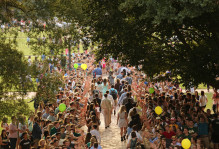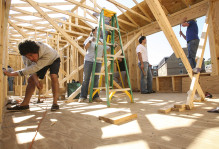Building Trust in Community
Two weekends ago, I awoke in a former monastery overlooking the James River, the Richmond skyline, and a stream of headlights coursing through I-95. I was spending the weekend at Richmond Hill with 25 others for the Community Trustbuilding Fellowship (CTF), a program of Hope in the Cities & Initiatives of Change. As part of this diverse group of active citizens ranging from LaGrange, Georgia, to Tulsa, OK, to Rwanda by way of DC, I have committed to spending five weekends over the first five months of 2017 in a process of personal transformation and social change.
It was an easy professional decision to apply for the program, as it aims to “increase the capacity of communities to overcome divisions of race, culture, economics, and politics by creating a network of skilled facilitators, capable team builders, informed advocates, and credible role models.” The alignment of the program’s goals with those of the Office of Community Engagement struck me when I first heard of it. I knew that I would sharpen my skills, learn new ways of thinking, and connect with co-conspirators in our work for good.
But I also joined this program because I wanted to grow as an active citizen. It was time for me to get outside of my regular ways of being in community, learn more deeply about my own bias and the history of my city, and develop friendships with people whose experiences and perspectives are different than mine but who share goals of working for reconciliation and justice.
Those who work in the OCE with me could tell you that I learned a ton during the weekend, since I can’t shut up about it. Topics included trust, values, bias, and the importance of a strong inner life. I’d like to pass one thought along to you here, about the concept of trustbuilding.
A core component of fruitful relationships that can lead to change is a shared sense of trust – which is why trustbuilding is central in the program’s name, and the name of the program’s text, written by CTF founder Rob Corcoran. As Corcoran writes, “building trust is the essential foundation for building healthy communities.” He continues, “I believe social action and legislation without accompanying changes in individual lives and relationships are unlikely to be effective over the long haul…. Without trust, true collaboration is unattainable. Without trust, we can’t get to real reform. Without trust—particularly trust across racial divides—it will be virtually impossible to generate the will to tackle the daunting challenges facing America’s communities.”
But creating trust, whether on personal or community levels, can be a hard thing to do, especially when there is a shared history of pain, exclusion, or hurt. It doesn’t come from telling others, “trust me,” but instead from acting in a trustworthy way. Onora O’Neill says in her TED talk that trustworthiness arises from demonstrations of competence, honesty, and reliability. Our faculty broke it down a bit more, saying that trustworthiness is built on character, which includes intent and integrity, and competence, which includes capabilities and whether you produce results. (My notes under “results” clarify: “not flakiness.”)
Throughout my life and in my work at W&M, I have developed trust with others by admitting when I’m wrong and forgiving when others do the same. By being transparent about my motives and goals, and allowing them to be interrogated and explored with others. By listening, hard core, even when I think I totally get what people are saying. By showing up, as my full self, knowing that I am going to mess up, but I’m not going to give up. And I still have a lot of trustbuilding and growing to do.
I’ve spent the weeks since the program mulling this over. In my relationships with beloveds, with friends and family, how do I demonstrate character and competence? When I want people to get on board with me at work, how can I check my intent and integrity? In my community, do I flake out, or do I follow through and stand up with people who rely on me? I’m curious to hear your thoughts, and look forward to sharing about future sessions in this program.




No comments.
Comments are currently closed. Comments are closed on all posts older than one year, and for those in our archive.